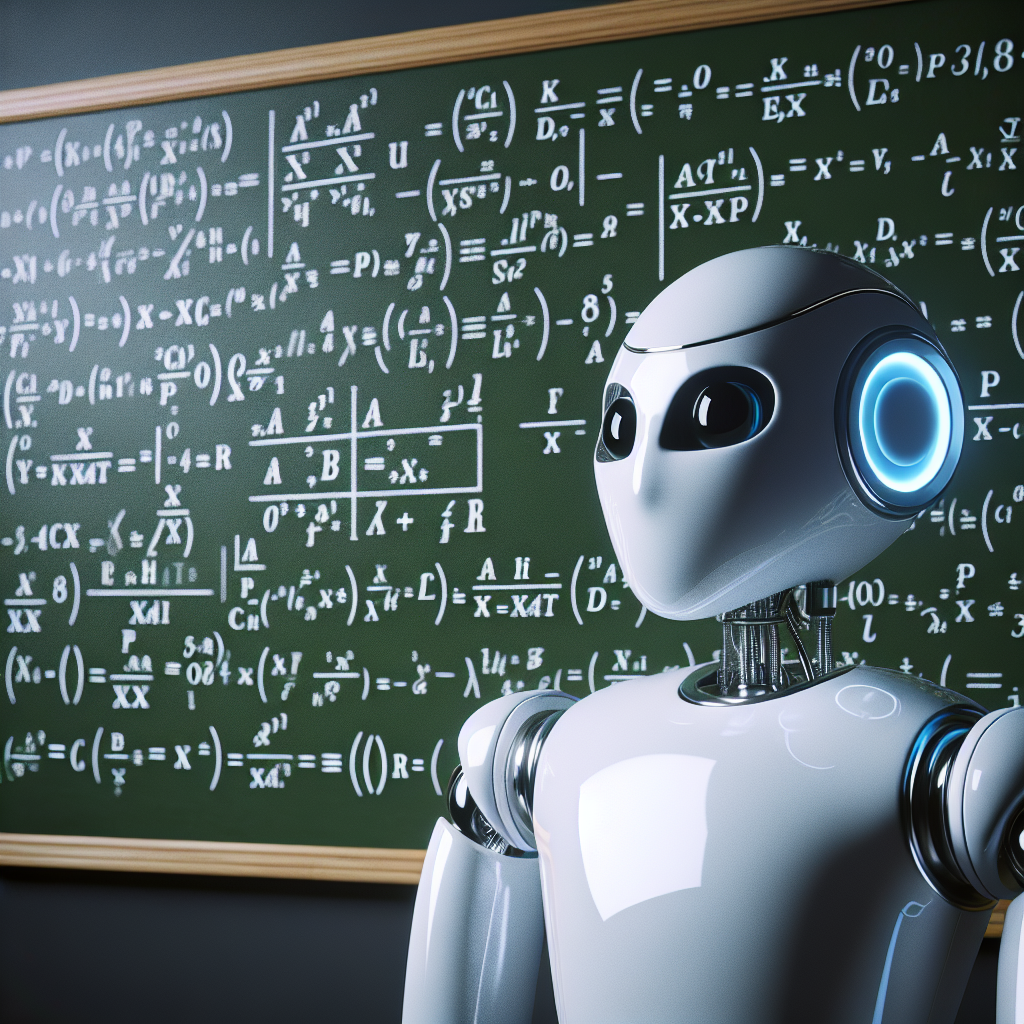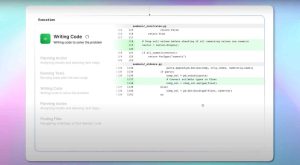
Artificial Intelligence (AI) is revolutionizing the way we learn and interact with subjects that have traditionally been challenging, such as mathematics. As we delve into the world of AI chatbots for math education, we uncover a new horizon where complex equations and mathematical concepts become more accessible and engaging. These chatbots are designed to offer personalized learning experiences, adapt to individual student needs, and provide immediate feedback, making them an invaluable resource for students and educators alike.
The best AI chatbot for math is not just a digital tool; it's a dynamic learning companion capable of transforming the educational landscape. With the ability to understand natural language queries and respond with step-by-step explanations, these chatbots empower learners to master mathematical concepts at their own pace. From solving algebraic expressions to understanding calculus theorems, AI chatbots provide a platform for interactive learning that is both effective and enjoyable.
If you're eager to harness the potential of AI chatbots for enhancing math education, our Learn AI Chatbot Course is the perfect starting point. This comprehensive program is meticulously crafted to guide marketers, marketing agency owners, and anyone interested in AI chatbots through the process of building powerful educational tools. Enroll now and embark on a journey to unlock the secrets of creating the best AI chatbot for your math learning needs.
Why Math Chatbots are Revolutionizing Learning

The landscape of education is undergoing a dramatic transformation with the advent of AI-driven technologies, and among these, math chatbots are at the forefront of this revolution. These intelligent systems harness the power of machine learning and natural language processing to simulate one-on-one tutoring, offering an unprecedented level of individualized attention and support. Their 24/7 availability means that students can access help at the exact moment they encounter a problem, breaking down barriers to learning that time constraints and availability of human tutors once posed.
What sets these chatbots apart is their ability to provide instant feedback and explanations, allowing students to learn from their mistakes in real-time. This immediate reinforcement helps solidify understanding and retention of mathematical concepts. Furthermore, the personalized learning pathways created by AI chatbots cater to the unique learning styles and paces of each student, ensuring that no one is left behind. This tailored approach is not easily replicated in traditional classroom settings, where one teacher must meet the needs of many students simultaneously.
Another significant advantage of math chatbots is their ability to track progress and adapt to a student's growing skills. By analyzing inputs and performance, these chatbots can identify areas of strength and weakness, providing targeted exercises to challenge students appropriately. This dynamic adjustment not only keeps students engaged but also encourages a growth mindset, where challenges are seen as opportunities for learning and improvement.
Features of an Effective Math AI Chatbot

To be considered the best ai chatbot for math, a system must possess a combination of features that not only enhance the learning experience but also make it efficient and accessible. The first and foremost feature is the ability to understand and process natural language, enabling students to communicate with the chatbot as they would with a human tutor. This facilitates a smooth interaction and makes the learning process more intuitive.
Another essential feature is a comprehensive knowledge base that includes a wide range of mathematical topics. An effective math AI chatbot should be able to assist with everything from basic arithmetic to complex calculus problems. Moreover, it should have the capability to explain concepts in multiple ways to accommodate different learning styles.
Adaptive learning technologies are a key component of a powerful math chatbot. These technologies allow the chatbot to personalize the learning material based on the student’s performance, ensuring that the content is neither too easy nor too hard. It's also important for the chatbot to integrate step-by-step problem-solving guides, which help students understand the process and the reasoning behind each step.
Lastly, the incorporation of gamification elements can significantly boost engagement and motivation. By turning learning into a game, students are encouraged to participate actively and consistently, which can lead to better learning outcomes. Interactive challenges, progress tracking, and rewards for achievements are all gamification strategies that an effective math AI chatbot can employ to maintain a student’s interest and enthusiasm.
Top AI Chatbots for Math Mastery

When it comes to achieving math mastery, the digital age offers a plethora of AI chatbot options. Among the best ai chatbot for math, a few stand out due to their exceptional capabilities and user satisfaction. One notable example is MathBot, which is renowned for its sophisticated natural language processing that simplifies complex mathematical dialogue into understandable conversations.
Another frontrunner is SolveIt, an AI chatbot known for its extensive library of math problems ranging from elementary level to college algebra and beyond. SolveIt's algorithm is designed to provide personalized feedback and hints, ensuring that learners are guided through their problem-solving journey effectively.
EquationMaster stands out for its adaptive learning features that tailor the difficulty of problems according to the user's proficiency, ensuring optimal challenge and progression. It's also praised for its detailed explanations and visual aids that help demystify challenging math concepts.
Lastly, QuickMaths is celebrated for incorporating gamification in learning. It engages students through interactive math games and challenges, making the learning process fun and highly engaging. The AI chatbot tracks progress and rewards users with badges and points, which serves as a motivational tool for continuous learning.
These AI chatbots are transforming the landscape of math education by providing personalized, engaging, and flexible learning tools that can significantly enhance a student's understanding and retention of mathematical concepts.
Integrating AI Chatbots into Your Math Curriculum
Integrating AI chatbots into a math curriculum can revolutionize the way students engage with the subject. The implementation process begins by identifying the specific educational goals and the areas within the curriculum where the AI chatbot can have the most impact. This could include individualized practice sessions, homework assistance, or providing supplementary explanations for complex topics.
Teachers and educators can then select the best ai chatbot for math that aligns with their educational objectives. It's essential to choose a chatbot that is compatible with the existing learning management systems and one that offers ease of access to both students and teachers. Moreover, the selected chatbot should have a user-friendly interface and be capable of offering instant and accurate responses to student inquiries.
To ensure successful integration, educators must also provide thorough training for both themselves and their students on how to use the AI chatbot effectively. This might include sessions on navigating the chatbot's features, understanding how to input questions, and interpreting the chatbot’s responses.
Furthermore, continuous monitoring and evaluation of the chatbot’s effectiveness within the curriculum are crucial. This involves gathering feedback from students on the chatbot’s usability and the quality of help it provides, as well as assessing the impact on student performance and engagement levels. Adjustments to the integration strategy may be required based on this feedback to maximize the educational benefits of the AI chatbot.
In conclusion, the strategic integration of AI chatbots into the math curriculum can create a more dynamic, personalized, and efficient learning environment, ultimately fostering a deeper understanding and mastery of mathematics for students.
Evaluating the Impact of Math AI Chatbots on Learning
As educational technology advances, evaluating the impact of math AI chatbots on learning outcomes becomes a crucial step in understanding their value in the classroom. The evaluation process involves collecting data on various metrics such as student engagement, comprehension, problem-solving skills, and overall academic performance. Surveys, quizzes, and standardized test scores can provide quantifiable evidence of the chatbot's effectiveness in enhancing the learning experience.
Qualitative data should also be considered, including student feedback on the usability of the chatbot, the clarity of explanations provided, and the level of interactivity and support felt during use. Teachers’ observations are equally important, as they can offer insights into the chatbot's role in reducing common misconceptions and facilitating a deeper understanding of mathematical concepts.
Data analysis can reveal patterns and correlations between chatbot usage and improvements in learning, allowing educators to make data-driven decisions on curriculum design and instructional strategies. It's also important to account for the diversity of learning needs among students when evaluating the chatbot's impact, ensuring that it supports a wide range of abilities and learning styles.
Ready to harness the power of AI chatbots in your own teaching or marketing strategy? Our Learn AI Chatbot Course is designed to guide you through the process of building and integrating these advanced tools. Don't miss this opportunity to enhance your curriculum or service offerings—enroll now!
Ultimately, the goal is to ensure that the integration of AI chatbots leads to a more enriching and effective learning environment. By systematically evaluating their impact, educators can refine their approach to include AI chatbots as a complementary tool that empowers students to achieve math mastery.








